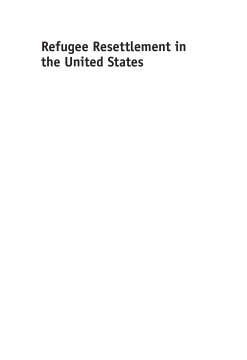
Additional Information
Book Details
Abstract
This edited volume brings together scholars from various disciplines to discuss how language is used by, for, and about refugees in the United States in order to deepen our understanding of what ‘refugee’ and ‘resettlement’ mean. The main themes of the chapters highlight:
- the intersections of language education and refugee resettlement from community-based adult programs to elementary school classrooms;
- the language (of) resettlement policies and politics in the United States at both the national level and at the local level focusing on the agencies and organizations that support refugees;
- the discursive constructions of refugee-hood that are promulgated through the media, resettlement agencies, and even the refugees themselves.
This volume is highly relevant to current political debates of immigration, human rights, and education, and will be of interest to researchers of applied linguistics, sociolinguistics, anthropology, and cultural studies.
Global refugee populations are growing, and their resettlement needs can no longer be considered marginal. This book, devoted to resettlement policies, practices and pedagogies for refugees, helps put the education of refugee students where it belongs – on the mainstream agenda.
Misty Adoniou, University of Canberra, Australia
This book is a must read for those working with refugees, from educators to policymakers and agency workers at the state and federal levels. The volume is key to continuing discussion about how policy interacts with practice, as well as with the lives of those directly affected by, and living among, policies.
Caroline Marks and Karen E. Lillie, State University of New York at Fredonia, USA
This important book offers an extraordinarily rich contribution to our understandings of the relationship between refugees and a broad range of social structures, including schools, the media, non-government organizations and bureaucracies. The collection provides original insights into the discursive, political and pedagogical processes that define refugees as a category and shape the experiences of those who fall within it. The chapters provide shining examples of interdisciplinary scholarship across the fields of applied linguistics, discourse analysis, and policy studies.
Joel Windle, Federal University of Ouro Preto, Brazil
Emily M. Feuerherm is Assistant Professor of Linguistics at University of Michigan-Flint, USA. Her research interests include second language acquisition, language policy, citizenship and participatory action research.
Vaidehi Ramanathan is Professor of Applied Sociolinguistics at University of California, Davis, USA. Her previous publications include Language Policies and (Dis)Citizenship: Rights, Access, Pedagogies (Multilingual Matters, 2013) and Bodies and Language: Health, Ailments, Disabilities (Multilingual Matters, 2009).
In an era of unprecedented forced migration, this book provides valuable and timely insights into how refugees in the US are impacted by the discourses, policy and education practices they encounter. The research-based chapters offer ways to rethink assumptions and ideologies surrounding refugees, so often positioned as victims and a burden on institutions. A readable and important book.
Jenny Miller, Monash University, Australia
This volume provides many excellent examples of the use of critical discourse analysis (...) Each chapter of this volume employs different ways of doing critical
discourse analysis to examine societal power relations through the examination of the language use. Therefore, the volume is definitely a good reference for graduate students and researchers who are looking to do critical discourse analysis. With its content, organization and the clarity in its language use, this book may also be of interest to a wider audience including policy makers, educators and agencies whose work concerns this diverse group often referred to as refugees.
Virak Chan, Purdue University, USA
Table of Contents
| Section Title | Page | Action | Price |
|---|---|---|---|
| Contents | vii | ||
| Acknowledgments | ix | ||
| Contributors | xi | ||
| 1 Introduction to Refugee Resettlement in the United States: Language, Policies, Pedagogies | 1 | ||
| Part 1 Defining Refugees through Policy and Practice | 19 | ||
| 2 Positionings of Refugees, Aliens and Immigrants in the Media | 21 | ||
| 3 The Different Meanings of the Word Refugee | 35 | ||
| 4 Restraining English Instruction for Refugee Adults in the United States | 54 | ||
| Part 2 Resettlement Practices and Effects on Education | 73 | ||
| 5 Building a Participatory Program for Iraqi Refugee Women and Families: Negotiating Policies and Pedagogies | 75 | ||
| 6 Learning English, Speaking Hindi: The Paradox of (Language) Integration Among Nepalis in the United States | 96 | ||
| 7 A ‘Slippery Slope’ Toward ‘Too Much Support’? Ethical Quandaries Among College Faculty/Staff Working with Refugee-Background Students | 118 | ||
| 8 ‘Talk English!’ Refugee Youth and Policy Shaping in Restrictive Language Contexts | 135 | ||
| 9 The US Refugee Resettlement Process: A Path to Self-Sufficiency or Marginalization? | 152 | ||
| 10 Language as a Fund of Knowledge: The Case of Mama Rita and Implications for Refugee Policy | 172 | ||
| Index | 191 |
